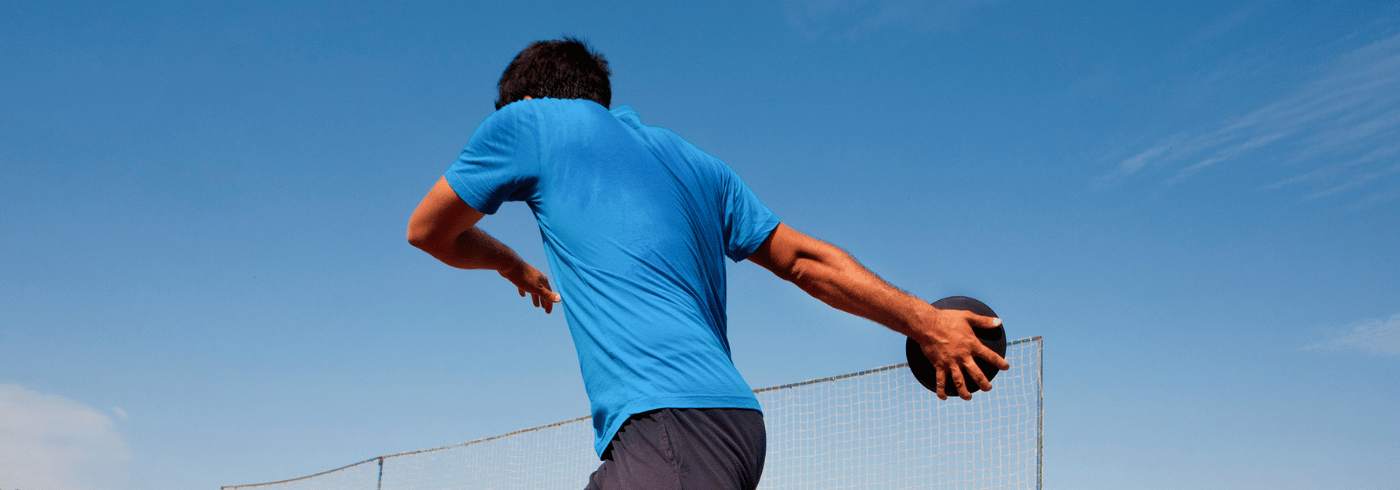
Equipment for Discus Throw: What Do You Need?
BY JOSH DOUGLAS
Throwing a discus far requires strength, technique, and speed. However, practising proper technique will be the most beneficial to improving throwing performance. Other than technique, building strength and working on speed is also essential as you could have the most perfect technique in the world, but if you don't have the strength, the discus will not fly as far as you would like. Yes, gym work will help with power and speed, but if you're looking for a proper sport-specific workout, various types of equipment offer just that.
Every athlete is different when it comes to what equipment a discus thrower needs. The differences come from either their performance level or their experiences.
IS A DISCUS ALL YOU REALLY NEED FOR ATHLETICS EVENTS AND THROWS TRAINING?

Despite equipment being personalised, I do believe there is a minimum amount of equipment every aspiring discus thrower should have. This should include;
NOTE: Chalk and bands aren't necessarily essential, but the chalk helps with grip, and the bands help with warming up. Ultimately a discus and some throwing shoes are all you need.
DISCUS IMPLEMENTS FOR BEGINNERS

Only some throwers starting out will have their own discus. Every competition will have some stadium implements you can use, and whilst that is beneficial when it comes to deciding on what discus to start with, you should eventually be looking at getting your own. The main reason you should have your own private discus is that you'll be used to throwing it and won't have hope that the competition you go to has some decent quality implements.

When I first picked up a discus, I didn't even know that there were throwing shoes for the sport and for a couple of months, I didn't have my own pair until my parents were sure I was going to stick to throwing. Like lifting shoes make lifting easier, throwing shoes makes throwing easier… I know… shocker! I would advise you to get some advice from your fellow athletes or even look online before you decide which brand to go for. Some shoes are more durable than others, some faster than others, but ultimately it is down to personal preferences.
Once you've got your bog standard pieces of athletics equipment and have had them for a while, it may be time to venture out to see what other types of equipment there are that may help you throw further. I subscribe to the narrative that throwing many different items will improve your throwing performance. Just throwing the discus itself will benefit you, but there are other types of equipment and training aids available that can facilitate different adaptations.
DISCUS TRAINING TOOLS
Other tools that may be used to enhance throwing performance include:
In terms of what equipment I have personally used, I have experimented with weighted discus, D-balls, bowling pins, kettlebells and, more recently, discus tools. My aim with this blog is to educate others on the different types of equipment available and how they can be used to improve performance.
WEIGHTED DISCS
An overweight discus is a discus that is heavier than the standard weight for the event. For men, the standard weight of a discus used in competition is 2 kilograms. For women, this weight is 1 kilogram. To help break this down, an overweight discus would be any discus that is heavier than the standard weights I have just referred to.
DOES WEIGHT MATTER IN DISCUS?
Overweight discs' are often used in training to help athletes build strength and improve their throwing technique.
In my experience, I have found that...
- With repeated exposure to overweight implements, the standard weight discus gradually feels lighter over time.
- The heavier discus helps to expose technical flaws within my own technique.
- Heavy implements can also help with learning the feeling of a good pull when releasing the discus. Thus when you drop down to your actual weight, you know what feeling you're looking for.
MY SUGGESTIONS...
- Athletes should slowly increase the weight of the discus so as not to increase the chance of injury.
- I suggest not changing the way you were throwing in response to the heavier implement. This can almost make any strength gains redundant as you will only be strong in a technique you don't actually use.
- I have also found the overweight implement can also be used as a predictor of current performance. I suggest that per quarter kilo increase in weight, there is a 5-7 metre difference. If you throw 45m with the 2kg, you should be throwing between 38-40m with the 2.25kg.
D-BALLS FOR DISCUS THROWERS
D-balls are essentially medicine balls that have a handle cut into them. They come in various weights and can be used to improve throwing performance. This training tool is often used when an athlete is performing drills and wants to pause in a particular position without dropping the weight. Another use of this training equipment is for indoor throwing. Many athletes don't have access to indoor facilities, so D-balls can safely be thrown into a sports hall net without damaging the floor.
The key to developing strength and a good technique is to throw often. If you are a part of an extensive training group, you won't be able to get as many throws in as you probably should be. In this circumstance, d-balls become a convenient part of your arsenal as you can quite easily go into your driveway, Keep hold of the implement and go through the throw multiple times.
MY EXPERIENCE AS A DISCUS THROWER WITH D-BALLS...
- I find this piece of equipment to be very beneficial when I have limited track access, as I can get lots of throws done in my driveway in a small period of time
- Because the weight is slightly further away from the body than it would be with a discus, it also helps with grip
- Because they come in a variety of weights, you can also get overweight training done whilst throwing them into a net
- I've also found they help with keeping my arm loose as it is a lot easier to grip this implement. Therefore, I can work on using my legs more.
DISCUS TOOLS & DENFI TOOLS
A discus tool, whilst resembling the shape of a small hammer, is a solid metal ball on a chain with a handle specifically designed to aid discus training. It is often used to help a discus thrower feel a long drag on release and emphasise keeping their hips ahead of the implementation throughout the throw. The discus tool can also be used to assist in creating a better orbit and rhythm, as it teaches patience and length throughout the throw.
MY EXPERIENCES WITH DISCUS TOOLS...
- I often found that my full throws felt longer than they actually were. This is because the tool was so far behind me when I had my hips to the front that I struggled with the timing of the release.
- The tool helps me find better feelings when throwing the discus: I now have an idea of what feelings I'm meant to recreate when throwing the discus
- It's quite a core workout: because the weight is further away from the body, it helps develop core strength that can transfer over to the actual throw.
- The handle could be more comfortable: especially at speed. The metal handle can dig in quite a lot. Thus I suggest investing in a cheap hammer glove
WHAT DISCUS THROW EQUIPMENT SHOULD YOU HAVE?
Whatever equipment you go for, there will always be some benefit to improving your throw. Almost all the equipment listed above will assist with discovering technical flaws, improve feeling and strength and will have some carry-over to the actual throw. I must emphasise that the tools mentioned above are not the be-all and end-all. They should be used in moderation and are, exactly like I said… "tools".
Some care should be taken when using these tools as they sometimes allow you to get away with technical flaws that would otherwise be picked up on. If you were to keep using that tool instead of the discus, you won't ever actually iron out your technical flaws.
I recommend having phases in the year where they are used and others where they are not. For example, winter is a great time to use D-balls as they can be thrown into the cage, allowing more throws and less muddy shoes.
I hope the suggestions I have listed in this blog have been helpful, and I look forward to producing future blogs where I'll expand on this topic further!
ABOUT JOSH DOUGLAS

Joshua Douglas is an U23 shotputter and discus thrower, who competes across the UK and is a high placing athlete in many of the events he competes in.
Caring, determined and analytical, Joshua is aiming for a medal at the senior championships and BUCS, as well as to compete at the British championships.
He is also currently undertaking an undergraduate degree in sport psychology, and is very passionate in helping other athletes in this area, as well as other areas in throwing and athletics!
Josh will mainly be talking about discus throw in his content. However, as he is studying sport psychology at university, he will also cover this area in his blogs!
Joshua is a member of Southampton AC & Loughborough Students AC.
Instagram: @bigbjosh






Leave a comment